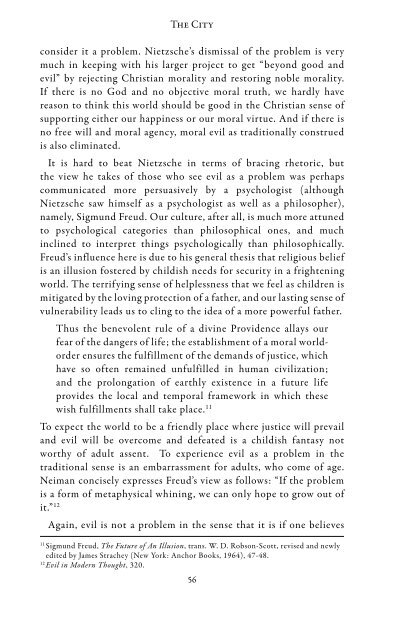THE CITY
h6c7p5d
h6c7p5d
You also want an ePaper? Increase the reach of your titles
YUMPU automatically turns print PDFs into web optimized ePapers that Google loves.
The City<br />
consider it a problem. Nietzsche’s dismissal of the problem is very<br />
much in keeping with his larger project to get “beyond good and<br />
evil” by rejecting Christian morality and restoring noble morality.<br />
If there is no God and no objective moral truth, we hardly have<br />
reason to think this world should be good in the Christian sense of<br />
supporting either our happiness or our moral virtue. And if there is<br />
no free will and moral agency, moral evil as traditionally construed<br />
is also eliminated.<br />
It is hard to beat Nietzsche in terms of bracing rhetoric, but<br />
the view he takes of those who see evil as a problem was perhaps<br />
communicated more persuasively by a psychologist (although<br />
Nietzsche saw himself as a psychologist as well as a philosopher),<br />
namely, Sigmund Freud. Our culture, after all, is much more attuned<br />
to psychological categories than philosophical ones, and much<br />
inclined to interpret things psychologically than philosophically.<br />
Freud’s influence here is due to his general thesis that religious belief<br />
is an illusion fostered by childish needs for security in a frightening<br />
world. The terrifying sense of helplessness that we feel as children is<br />
mitigated by the loving protection of a father, and our lasting sense of<br />
vulnerability leads us to cling to the idea of a more powerful father.<br />
Thus the benevolent rule of a divine Providence allays our<br />
fear of the dangers of life; the establishment of a moral worldorder<br />
ensures the fulfillment of the demands of justice, which<br />
have so often remained unfulfilled in human civilization;<br />
and the prolongation of earthly existence in a future life<br />
provides the local and temporal framework in which these<br />
wish fulfillments shall take place. 11<br />
To expect the world to be a friendly place where justice will prevail<br />
and evil will be overcome and defeated is a childish fantasy not<br />
worthy of adult assent. To experience evil as a problem in the<br />
traditional sense is an embarrassment for adults, who come of age.<br />
Neiman concisely expresses Freud’s view as follows: “If the problem<br />
is a form of metaphysical whining, we can only hope to grow out of<br />
it.” 12<br />
Again, evil is not a problem in the sense that it is if one believes<br />
11<br />
Sigmund Freud, The Future of An Illusion, trans. W. D. Robson-Scott, revised and newly<br />
edited by James Strachey (New York: Anchor Books, 1964), 47-48.<br />
12<br />
Evil in Modern Thought, 320.<br />
56


